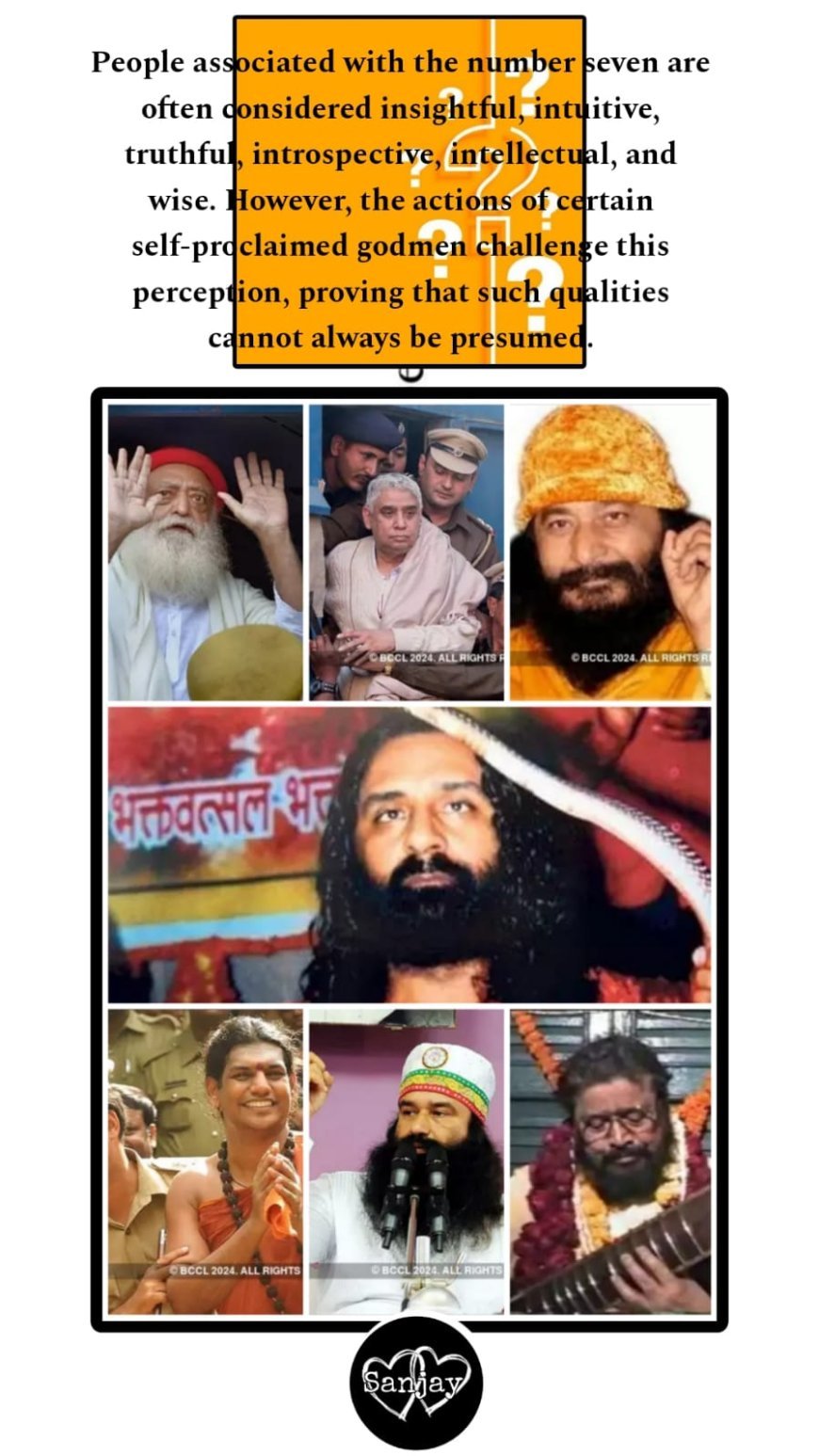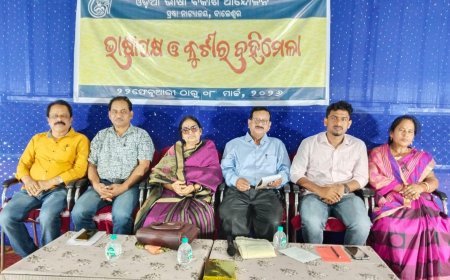The Perils of Blind Faith: Why People Fall Prey to Godmen

People associated with the number seven are often considered insightful, intuitive, truthful, introspective, intellectual, and wise. However, the actions of certain self-proclaimed godmen challenge this perception, proving that such qualities cannot always be presumed.
Here’s a summary of the cases involving godmen who faced legal troubles:
1. Asaram Bapu: Sentenced to life imprisonment for raping a teenage devotee in 2013 under the pretext of exorcism.
2. Gurmeet Ram Rahim Singh: Convicted of rape by a CBI court. The Dera Sacha Sauda leader raped a follower on the sect's Sirsa campus.
3. Rampal: Accused of murder and sedition, currently in jail. Police found five women and an infant dead at his Hisar ashram during his 2014 arrest after his supporters resisted with human barricades.
4. Ashutosh Maharaj: Declared dead in 2014 but preserved in a freezer by followers amidst a bitter succession dispute in his Punjab-based sect.
5. Ichchadhari Bhimanand: Former hotel guard turned godman, convicted for running a high-profile sex racket.
6. Nithyananda: Faces charges of rape and unnatural sex. A 2010 video showed him in a compromising position with a Tamil actress.
7. Balak Brahmachari: After his death in 1993, authorities struggled for 55 days to cremate him, battling disciples and discovering bombs at his ashram in West Bengal.
These cases highlight the legal and ethical controversies surrounding some self-styled godmen in India.
India, a land of diverse cultures and religions, has long been a fertile ground for spirituality. While many legitimate spiritual leaders promote goodwill and ethical living, a darker side has emerged over time — that of self-styled "godmen" exploiting the faith and vulnerabilities of people for personal gain. The alarming stories of godmen such as Asaram Bapu, Gurmeet Ram Rahim Singh, and Rampal reveal how blind faith can lead to devastating consequences. Despite repeated scandals, many people still fall prey to their deceptive charm. The question arises: why do people believe in so-called godmen and magic rather than embracing logic and rationality?
The Roots of Belief in Godmen
Crisis of Faith and Hope:
In times of distress, people often seek solace in higher powers. Godmen, with their promises of miracles and supernatural solutions, seem like beacons of hope. Whether it’s financial instability, health problems, or emotional turmoil, these figures offer quick fixes, making them attractive to those in despair.
Cultural Conditioning:
Many Indian households grow up with a belief in divine intervention. This deep-rooted cultural conditioning makes individuals more susceptible to believing in people who claim to have divine powers or access to the spiritual realm.
Charismatic Personalities:
Most godmen have an uncanny ability to influence their followers through charm, eloquence, and a pretense of humility. This charisma often blinds people to their hidden motives and questionable practices.
Community and Belonging:
Ashrams and sects often provide a sense of community, attracting individuals who feel alienated in their personal lives. This collective experience can reinforce belief, as groupthink leads to the suppression of dissent or doubt.
Lack of Education and Critical Thinking:
In regions where education is lacking, individuals often fail to question authority figures. They accept claims of miracles and supernatural powers without skepticism, as they lack the tools to distinguish between faith and exploitation.
The Consequences of Blind Faith
Exploitation of Vulnerabilities:
From sexual abuse to financial scams, godmen have repeatedly preyed on their followers’ innocence. Cases like Asaram Bapu’s rape conviction and Gurmeet Ram Rahim Singh’s exploitation of devotees highlight the extent of this manipulation.
Obstruction of Justice:
The incidents involving Rampal and Balak Brahmachari demonstrate how these cult-like figures can disrupt law enforcement efforts. Their followers, often brainwashed, create human shields or resort to violence to protect them.
Loss of Rationality:
Faith in godmen often replaces critical thinking with superstition. This blind belief can prevent people from seeking logical solutions, such as consulting a doctor for illnesses or addressing mental health issues through counseling.
Encouraging Logic Over Magic
To combat the growing menace of fake godmen, society must focus on fostering rationality and skepticism. Here are some steps to reduce the influence of such figures:
Education and Awareness:
Teaching critical thinking from an early age is essential. Schools and communities should emphasize scientific reasoning and empower individuals to question authority and dubious claims.
Strengthening the Legal Framework:
Laws must be strictly enforced to hold godmen accountable for their actions. Swift justice in cases of exploitation can deter others from committing similar crimes.
Promoting Mental Health Support:
Many people turn to godmen for emotional and psychological support. Providing accessible mental health services can help reduce this dependence.
Media Vigilance:
Media plays a crucial role in exposing the truth. Investigative journalism, documentaries, and public awareness campaigns can shed light on the fraudulent activities of self-styled godmen.
Spiritual Reform:
Genuine spiritual leaders and organizations should denounce fake godmen and promote authentic practices that uplift rather than exploit followers.
Conclusion
The persistence of blind faith in godmen reflects a larger societal challenge. While faith itself is not the problem, the exploitation of faith is. It is imperative that society transitions from unquestioning belief to a culture of inquiry and logic. Education, awareness, and a commitment to truth can help break the chains of superstition and prevent future generations from falling prey to deceitful godmen. Ultimately, it is the collective responsibility of individuals, communities, and authorities to replace magic with logic and ensure that faith leads to enlightenment, not exploitation.










































